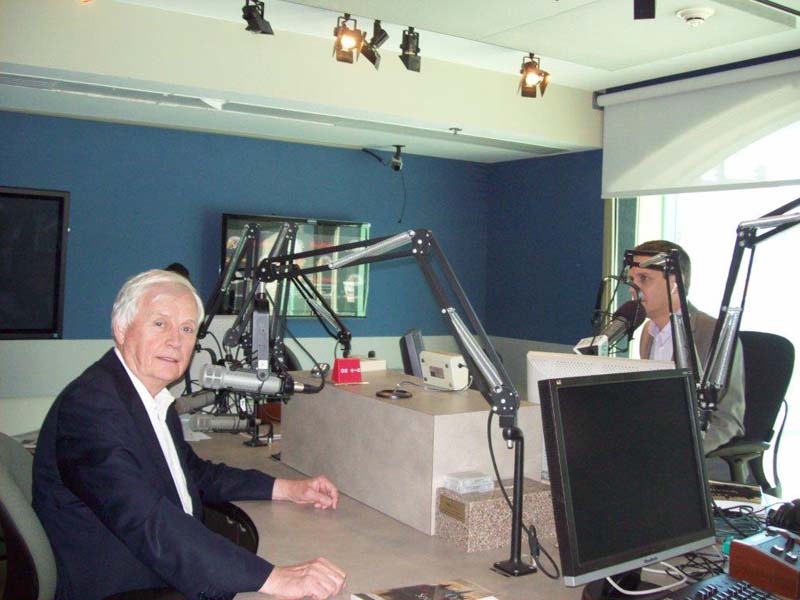Travel the World via Radio?
March 4, 2021
So have you considered radio travel?
What on earth, you may ask, is that!
To begin, a backgrounder: When I was being interviewed by CBC Radio on such topics as conflicts-of-interest, the auditor general’s reports, democratic accountability, Canada’s scandalous Senate, electoral reform, and referendums, I enjoyed the cross-Canada glimpses made possible by radio. Here’s how that happened. With CBC budget cutbacks, regional stations no longer had staff to deal with national stories. So the Broadcasting Centre in Toronto came up with “Syndication” interviews. A person qualified to speak on the issue of the day would be contacted, pre-interviewed to ensure producers that she or he actually knew the subject and was current with developments, and then sent a schedule of a dozen stations across the country whose host would phone, at her or his sequentially specified time, to conduct an interview for eight or ten minutes. For their part the regional stations – the first dozen who’d asked to participate because the topic seemed of interest for their listeners – got an intro to set up the issue of the day, usually with a voice clip of whoever was central in the galvanizing news storm, plus a list of questions to ask, which some hosts followed while others preferred freelancing.
 |
|
Apart from CBC Syndication “radio travel,” Patrick Boyer also made trips to studios, as pictured here just prior to an interview at Ottawa’s CFRA Studio in 2015. On this occasion, as on many via CBC Syndication, the subject was the ever-reliable Senate of Canada producing yet more outrages. Boyer became so frustrated by the existence of this anomalous legislative body that he wrote Our Scandalous Senate about the “unelected, unaccountable, and unnecessary” body. |
These ten-minute segments formed part of each CBC regional station’s morning news and information programming, or its late afternoon drive-home program which, in addition to local news, sports, and weather, encapsulated succinct insight into the day’s top stories, provided by their guest whom, they proudly announced, they’d just managed to reach at his home in Toronto, or Muskoka, or wherever I was. It was the way CBC Central helped its many staff-strapped regional stations still appear to listeners like bigger players than they in fact were. Syndication was an inspired solution.
Moments ahead of the interview, a producer at the next station up would phone me, to be sure I was still alive and that our phone connection was properly working and voice level duly tested. Then I’d be left listening to several minutes of live programing that preceded my allotted slot. From St. John’s I’d hear about the Coast Guard calling off a search for a missing dory and its crew due to blizzard conditions. Waiting for Fredericton, I learn the scores of the girls’ basketball teams. From Montreal, a chance to listen to reports about Mafia connections to the construction companies that built city overpass bridges in the 1970s that were already crumbling and hitting cars and pedestrians with chunks of concrete. From Toronto, a report on how the City was still working on a rail link to the airport. From Windsor, news about an incident with trucks backed up at the border crossing to the USA. Winnipeg offered an update on problems with Indigenous people, first in the city’s North End, then in the province’s northern reaches. Regina had a hot issue about the Wheat Board’s two-price marketing of grains, plus a quick update on a junior hockey team’s game that evening. Calgary was adjusting to world oil market conditions. Victoria’s weather report called for continuing mild temperatures and more rain.
By the time I’d finished ringing all the changes on the dramatic subject of the hour, interview after syndicated interview, I’d become fairly polished in answering the same question over and over. I sometime wondered if I was actually repeating myself in the interview, or just recalling having said the same thing four times already in the past hour.
An emotional feel for the wide-range of local conditions
But always, by the end, I felt satisfaction in having, over two or three hours, been in all parts of our sprawling country and getting an emotional feel for the wide-range of local conditions – as if I’d actually been back in each of these places again.
Further CBC budget cuts from Ottawa seem to have put the kibosh on syndication, but as always happens in life, something else takes its place. “Radio Garden” now lets you drop into any of the far-flung communities across Northern Ontario and the province’s two time zones. But that’s not all. In the Radio Garden, you can just as easily visit, say, Ireland. Just halfway up the west coast you can listen to a station playing Irish Pub music. Or Bulgaria, where you can check-in on what the station at Varna is broadcasting. And so on, around the globe. Where would you like to be?
The series of green dots growing in Radio Garden’s Google Earth Map each represent radio stations all around the world. By clicking on any of the countless pale green dots, you can hear that locality’s station (or its many stations, in the case of larger centres) with high quality reception.
Now you, too, can savour Radio Travel, but in a way that far transcends my back-shop experience with CBC Syndication. Start from Bracebridge, go across Canada, travel abroad, wherever your ears and interests lead you. For this new escape to freedom, here’s the on-ramp:
Just click a dot where you’d like to be, or are curious about. You can also test your knowledge of geography. You might even get harmlessly lost, disappearing into time and space, depending on what’s being broadcast.
Oh yes, and it’s a very safe way to travel!
Copyright © 2023 || Website Development by E-griculture.com
